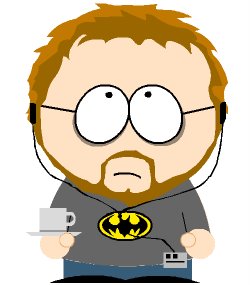The phrase "You can't have your cake and eat it too" has always confused me. I first heard it as a child, when I wanted to do two things and I was only allowed one or the other. I don't hear it very often any more, but it still pops up when reading, and sometimes real-life situations. (I want to stay up and watch videos but still get my research paper finished, for instance. No really. I do.) It's typically meant to mean you can't have two choices, but rather one or the other. It's more aptly applied specifically to two diametrically opposed situations (i.e., studying and watching t.v., eating potato chips chips and losing weight, having an extensive comics collection and having a girlfriend, etc.). A variation of that would be a businessman who wants to be successful but also wants to have a good time, something unrealistic in today's competitive climate.
"You can't have your cake and eat it too"? I mean, as a fellow who enjoys a nice pastry every once in a while - sometimes even more than once in less than a while - it lacked believability. The entire purpose of having a cake is to eat it. You don't buy a cake unless you're going to eat it, right? What kind of sadistic S.O.B. gives you a cake and then doesn't let you eat it? And what's the alternative? Eating your cake but not having it? That's not even possible!
It's been a small mission for me to look it up, to stop this confusion once and for all, and today was the first day that I was at the computer when I remembered my directive. Google saves the day again.
The general consensus is that the meaning of the phrase is not your inability to eat the cake that is in front of you, with your name on it in delicious blue icing (note to self: have dinner soon), but rather, your inability to still have the cake after you've eaten it. You can't both eat the cake and have it sitting on your table, looking beautiful and cake-y. The original wording of the phrase seems to have been "you can't eat your cake and still have it", which makes a little more sense. But only a little: why would you want to have a cake just sitting around, when its appearance appeals much less than its flavour would? The explanation comes in a slightly different usage of the idiom.
The phrase is often also applied to a conflicting situation of use-and-destroy: where you want to use / eat / enjoy something but still have it to use / eat / enjoy later. For example, you want to buy a nice dress (eating the cake) but you don't want to spend any money (having the cake). In this case, the inverted "eat and have" version makes much more sense, but I've never really heard it used in this way. Regardless, I now understand what the phrase is supposed to mean, and am no longer confronted with images of hungry people staring longingly at a cake that's on their counter, begging some cruel authority figure to be allowed to have at least have one tiny piece...
Thursday, September 15, 2005
Subscribe to:
Post Comments (Atom)

1 comment:
Thanks, I always wondered about that!! It never made sense to me for the same reasons that it didn't make sense to you. But I get it now.
Post a Comment